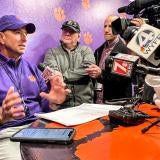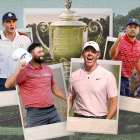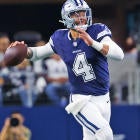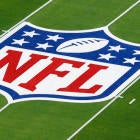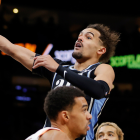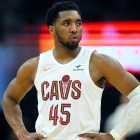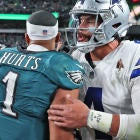Every Friday, the Friday Five will rank something in the world of college football -- anything and everything from the logical to the illogical. This week, we rank Heisman-winning quarterbacks who never quite worked out in the NFL.
On Friday, the Cleveland Browns made an announcement that everybody knew they were going to make at some point. The Browns announced they were releasing Johnny Manziel, a quarterback the team traded up to take with the 22nd pick of the 2014 NFL Draft.
It was the highlight of Manziel's NFL career thus far, as things haven't worked out on the field, and they've been even more of a mess off of it.
Anyway, I'm not here to write about Manziel, but the news of his release did inspire this week's Friday Five. Manziel is not the first former Heisman Trophy-winning quarterback to move on to the NFL and struggle, and he certainly won't be the last. For every Cam Newton, there are 10 Johnny Manziels because playing quarterback is difficult, and there's a large difference in doing so between the college and pro levels.
So for this week's Friday Five, I've decided to rank the five former Heisman Trophy winning quarterbacks who struggled the most in the NFL. Now, I have some guidelines. I'm only going back as far as the beginning of the Super Bowl, so the last 50 years. Also, quarterbacks who are still playing do not count, so you won't see Manziel, Robert Griffin III, Sam Bradford, Marcus Mariota or Jameis Winston on this list.
Nor will you see Eric Crouch, Charlie Ward or Jason White. I wanted to limit it to quarterbacks who actually played in the league.
Also, where the players were drafted certainly has an effect on their rankings. Sure, somebody like Ty Detmer didn't have an amazing career, but he was a ninth-round draft pick. He was never supposed to, and I want expectations to play a role.
So without further ado, here's this week's Friday Five.
5. Danny Wuerffel: Wuerffel won the Heisman Trophy with the Florida Gators in 1996, and was then a fourth-round pick by the New Orleans Saints that following spring in the NFL Draft. He'd never be able to rekindle the college glory days in the NFL. In three seasons with the Saints, he'd start only six games, losing four of them while completing less than 50 percent of his passes for nine touchdowns and 16 interceptions. He then left in 2000 to play for the Rhein Fire in NFL Europe, leading the Fire to a World Bowl VII championship, even being named the game's MVP. He'd then return to the NFL with the Packers before leaving for a season with the Bears, and then finally with the Redskins in 2002 ... where he was coached by the man who coached him at Florida, Steve Spurrier. It didn't work out well for either of them, and Wuerffel called it a career after that.
4. Tim Tebow: I bet you thought Tebow would be a bit higher on this list, didn't you? No, I didn't just put him here because I wanted two Gators in a row. I put him here because, even though Tebow didn't come close to having an NFL career like the one he had in college, the truth is, he wasn't all that bad. He's also the only quarterback on this list to start in two NFL playoff games, let alone one. Still, even so, Tebow wasn't exactly a great. The problem NFL teams always had with him was they never saw him as much of a passer, and his career completion percentage of 47.9 sure didn't do anything to dissuade them of that opinion. He was effective as a rusher, though, and including playoff games, he had a record of 9-7 as a starter.
3. Matt Leinart: The Arizona Cardinals selected Matt Leinart out of USC with the 10th pick of the 2006 draft. He won the Heisman in 2004 and helped lead USC to back-to-back title game appearances. And along with teammate Reggie Bush, he was basically the face of college football at the time. Unfortunately for Leinart, while he was well suited to what USC wanted him to do, his game didn't really translate to the NFL. He started 11 games for the Cardinals as a rookie, but would start only seven more games over the next five seasons, losing his starting gig to 36-year old Kurt Warner in 2007. After leaving Arizona in 2009, Leinart was away from the game for a year before resurfacing with the Houston Texans in 2011. He signed with the Raiders in 2012, appeared in two games and then hung up the cleats.
2. Andre Ware: After a monster season which saw Ware throw for 4,699 yards and 46 touchdowns for Houston, Ware was named the winner of the 1989 Heisman Trophy, narrowly edging out Indiana running back Anthony Thompson. Ware would then parlay that senior season into being the seventh pick of the 1990 NFL Draft, where the Detroit Lions took him. As is often the case when it comes to the Lions, things didn't go well. Not only did Ware start only six games over four seasons, he only appeared in 14. He completed only 51.6 percent of his passes, with five touchdowns and eight interceptions. Not in a season, but in his entire four-year career. He just couldn't beat out Rodney Peete or Erik Kramer for the chance to hand the ball off to Barry Sanders and watch the magic happen.
1. Steve Spurrier: Before he was the Ball Coach, he was the Heisman Trophy-winning quarterback from Florida. Spurrier won the Heisman in 1966, and was then selected by the 49ers with the third pick overall in the 1967 NFL Draft. Now, Spurrier's career would last longer than every other player on this list, as he played for 10 seasons. It's just, in those 10 seasons, he started only 38 games, and 12 of those starts came in his final season with the 1976 Tampa Bay Buccaneers. At the time the Bucs were an expansion franchise, and the 1976 season was their first in existence. Spurrier started 12 games that year and lost all 12 of them. He'd lose 24 of the 38 starts he made in the NFL, complete only 51.9 percent of his passes, and throw 20 more interceptions (60) than he did touchdowns (40). Following that 1976 season Spurrier would retire from playing and get into coaching. It was clearly the right decision.
Honorable Mention: Gary Beban, Troy Smith, Pat Sullivan, Gino Torretta, Chris Weinke










